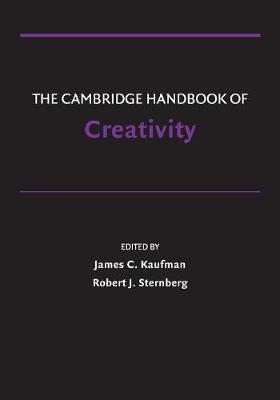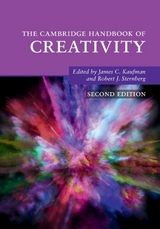
The Cambridge Handbook of Creativity
Cambridge University Press (Verlag)
978-0-521-73025-9 (ISBN)
- Titel erscheint in neuer Auflage
- Artikel merken
The Cambridge Handbook of Creativity is a comprehensive scholarly handbook on creativity from the most respected psychologists, researchers and educators. This handbook serves both as a thorough introduction to the field of creativity and as an invaluable reference and current source of important information. It covers such diverse topics as the brain, education, business, and world cultures. The first section, 'Basic Concepts', is designed to introduce readers to both the history of and key concepts in the field of creativity. The next section, 'Diverse Perspectives of Creativity', contains chapters on the many ways of approaching creativity. Several of these approaches, such as the functional, evolutionary, and neuroscientific approaches, have been invented or greatly reconceptualized in the last decade. The third section, 'Contemporary Debates', highlights ongoing topics that still inspire discussion. Finally, the editors summarize and discuss important concepts from the book and look to what lies ahead.
James C. Kaufman, Ph.D., is an Associate Professor of Psychology at the California State University at San Bernardino, where he directs the Learning Research Institute. Dr Kaufman's research focuses on the nurturance, structure and assessment of creativity. He is the author or editor of more than 150 publications, including sixteen books either published or in press. These books include Creativity 101 (2009), Essentials of Creativity Assessment (with Jonathan Plucker and John Baer, 2008) and The International Handbook of Creativity (with Robert J. Sternberg, 2006). His research has been featured on CNN, NPR and the BBC and in the New York Times, the Los Angeles Times and New Yorker. Kaufman is a founding co-editor of the official journal for the American Psychological Association's Division 10, Psychology of Aesthetics, Creativity, and the Arts. He is also the associate editor of Psychological Assessment and the Journal of Creative Behavior, the editor of the International Journal of Creativity and Problem Solving and the series editor of the Psych 101 series. He received the 2003 Daniel E. Berlyne Award from APA's Division 10, the 2008 E. Paul Torrance Award from the National Association of Gifted Children, and the 2009 Early Career Research Award from the Western Psychological Association. Robert J. Sternberg, Ph.D., is Dean of the School of Arts and Sciences and Professor of Psychology and Education at Tufts University. He is also Honorary Professor of Psychology at the University of Heidelberg. He was previously IBM Professor of Psychology and Education in the Department of Psychology, Professor of Management in the School of Management, and Director of the Center for the Psychology of Abilities, Competencies, and Expertise at Yale. His Ph.D. is from Stanford, and he holds 11 honorary doctorates. Sternberg was the 2003 President of the American Psychological Association and is the past President of the Eastern Psychological Association. He is currently President of the International Association for Cognitive Education and Psychology and President-Elect of the Federation of Associations of Behavioral and Brain Sciences. The central focus of his research is on intelligence, creativity and wisdom, and he also has studied love and close relationships as well as hate. He is the author of about 1,200 journal articles, book chapters, and books, and he has received more than $20 million in government and other grants and contracts for his research, conducted in five different continents. He has won more than two dozen awards for his research. Sternberg has been listed in the APA Monitor on Psychology as one of the top 100 psychologists of the twentieth century and is listed by the ISI as one of its most highly cited authors in psychology and psychiatry.
Part I. Basic Concepts: 1. Creativity research: a historical view Mark A. Runco and Robert S. Albert; 2. Theories of creativity Aaron Kozbelt, Ronald A. Beghetto and Mark A. Runco; 3. Assessment of creativity Jonathan A. Plucker and Matthew C. Makel; 4. The roles of creativity in society Seana Moran; Part II. Diverse Perspectives on Creativity: 5. Cognition and creativity Thomas B. Ward and Yuliya Kolomyts; 6. The function of personality in creativity: the nature and nurture of the creative personality Gregory J. Feist; 7. How does a visual artist create an artwork? Paul J. Locher; 8. Organizational creativity: a systems approach Gerard J. Puccio and John F. Cabra; 9. Creativity in highly eminent individuals Dean Keith Simonton; 10. Everyday creativity: process and way of life – four key issues Ruth Richards; 11. The neurobiological foundation of creative cognition Allison B. Kaufman, Sergey A. Kornilov, Adam S. Bristol, Mei Tan and Elena L. Grigorenko; 12. Developmental approaches to creativity Sandra W. Russ and Julie A. Fiorelli; 13. Educational creativity Jeffrey K. Smith and Lisa F. Smith; 14. Cross cultural perspectives on creativity Todd Lubart; 15. Evolutionary approaches to creativity Liane Gabora and Scott Barry Kaufman; 16. Functional creativity: 'products' and the generation of effective novelty David Cropley and Arthur Cropley; Part III. Contemporary Debates: 17. Is creativity domain specific? John Baer; 18. The creativity-motivation connection Beth A. Hennessey; 19. Individual and group creativity R. Keith Sawyer; 20. Creativity and mental illness Paul J. Silvia and James C. Kaufman; 21. The relationship between creativity and intelligence Kyung Hee Kim, Bonnie Cramond and Joyce VanTassel-Baska; 22. Divergent thinking, creativity, and ideation Mark A. Runco; 23. Creativity in the classroom Ronald A. Beghetto; Part IV. Conclusion: 24. Constraints on creativity: obvious and not so obvious Robert J. Sternberg and James C. Kaufman.
| Erscheint lt. Verlag | 30.8.2010 |
|---|---|
| Reihe/Serie | Cambridge Handbooks in Psychology |
| Zusatzinfo | 6 Tables, unspecified; 3 Line drawings, unspecified |
| Verlagsort | Cambridge |
| Sprache | englisch |
| Maße | 178 x 254 mm |
| Gewicht | 860 g |
| Themenwelt | Geisteswissenschaften ► Psychologie ► Allgemeine Psychologie |
| Geisteswissenschaften ► Psychologie ► Verhaltenstherapie | |
| Medizin / Pharmazie ► Medizinische Fachgebiete ► Psychiatrie / Psychotherapie | |
| Schlagworte | Kreativität |
| ISBN-10 | 0-521-73025-2 / 0521730252 |
| ISBN-13 | 978-0-521-73025-9 / 9780521730259 |
| Zustand | Neuware |
| Informationen gemäß Produktsicherheitsverordnung (GPSR) | |
| Haben Sie eine Frage zum Produkt? |
aus dem Bereich



